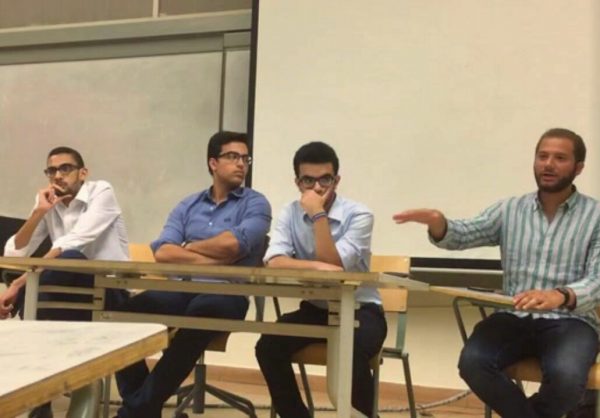
Follow @ahmedhrefai
In a poorly attended open discussion held on Wednesday, attendees debated with a panel of four high board Student Union (SU) members–including President Mohamed Gadalla and Vice President Ahmed Gazar–the Union’s role and position on a number of high priority issues including tuition fees and the dismissal of over 170 workers last week.
President Gadalla said that the Union will intensify its efforts to raise awareness to the student body about the implications of the tuition fee hike, adding however that the Union is not responsible for galvanizing students or manufacturing student dissent.
The panel briefly addressed the previous workers’ status, detailing the Union’s efforts to offer them support and financial assistance.
“We are currently working on the permits to establish a workers’ relief fund. I think that will be a big help and a good gesture from the students,” Omar Rezk, representation committee chairperson at the SU, told The Caravan.
Much of the meeting, however, revolved around a disagreement between Union members and participants over the Union’s role in leading the movement, and the most efficient methods of voicing students’ demands in the face of the rise in tuition fees.
Gadalla said that the Union in itself does not hold political positions and does not work to influence students or initiate a dissenting movement, but that it exists rather to support the student body’s demands.
“There will be different future methods of communication [between the SU and the student body]. When it is evident to us that 50 percent plus one of the student body want to take action, the SU will commit to vanguarding the student’s wishes and leading their movement,” Rezk said during the discussion.
“It is now time for people to be aware that there is a problem. If people don’t become cognizant of the issue at the right time, we won’t find a solution. As long as we are asleep we won’t find a solution,” Gadalla told one of the attendees.
Several participants, however, expressed that it was in fact part of the Union’s role to organize and mobilize students since a majority of the student body is not proactive.
A survey created by the SU on social media as an attempt to gauge students’ sentiments regarding the tuition increase has so far garnered 564 responses.
The survey showed that 87 percent were aware of the issue, and that almost 90 were dissatisfied with it.
A majority of students answered that the Union should–in talks with University administration–negotiate for a complete “tuition fee reformulation,” and if that demand is not met, the majority voted that the case be “upscale[d] with media and judiciary bodies.”
Other respondents opted for more extreme methods such as civil disobedience and striking.
Gadalla and Rezk both stressed that the Union will not be pursuing strategies that would prevent students from attending classes, such as closing the University gates or blocking classrooms.
“We will assist and support the students in any form of protest, except for closing the gates. We don’t want to risk the physical, social, or educational well-being of the students,” Rezk said.
Rezk told The Caravan that the Union is concentrating its efforts in increasing awareness amongst the student body about the issue.
“We will be putting out social media campaigns before the semester begins detailing the history of the tuition issue. It will cover the following points: what happened, what is [currently] going on, and how we could achieve what we want,” he said.
Rezk added that there will be alternative methods of engaging and communicating with the student body in the future but was not willing to reveal them at the moment.
He also noted that the SU has been communicating regularly with the administration regarding the issue.
“We very well informed [the administration] that students are not satisfied with what’s happening and that they should take more steps to control the anger and the dissatisfaction, and we are waiting to see what they’re going to do.”
The administration has been vocal about its attempts to alleviate students’ financial concerns.
In May 2015, the administration released a statement informing the community of plans to discontinue academic achievement scholarships in favor of reallocating funds to need-based financial aid awards.
The administration has, according to Gadalla, increased the budget for financial aid by “millions of dollars.”
Last Spring, the administration reallocated a sum of $5 million into an emergency grant designed to “enable all currently enrolled students to complete the current academic year and which can set the stage for their success in future years,” according to an e-mail sent by President Francis Ricciardone to the AUC community earlier in November.
Tuition fees at AUC experienced a sharp increase of up to 30 percent after the currency floatation.
In 2014, the administration decided that 50 percent of tuition fees are to be denominated in USD, a decision that has been the subject of a lawsuit between the University and a group of parents.
A court ruling by Egypt’s Administrative Court in March ordered the University to denominate tuition fees in Egyptian pounds only. The University has since then appealed the ruling.
The current price of one credit hour at AUC is currently fixed at 9,800 EGP.